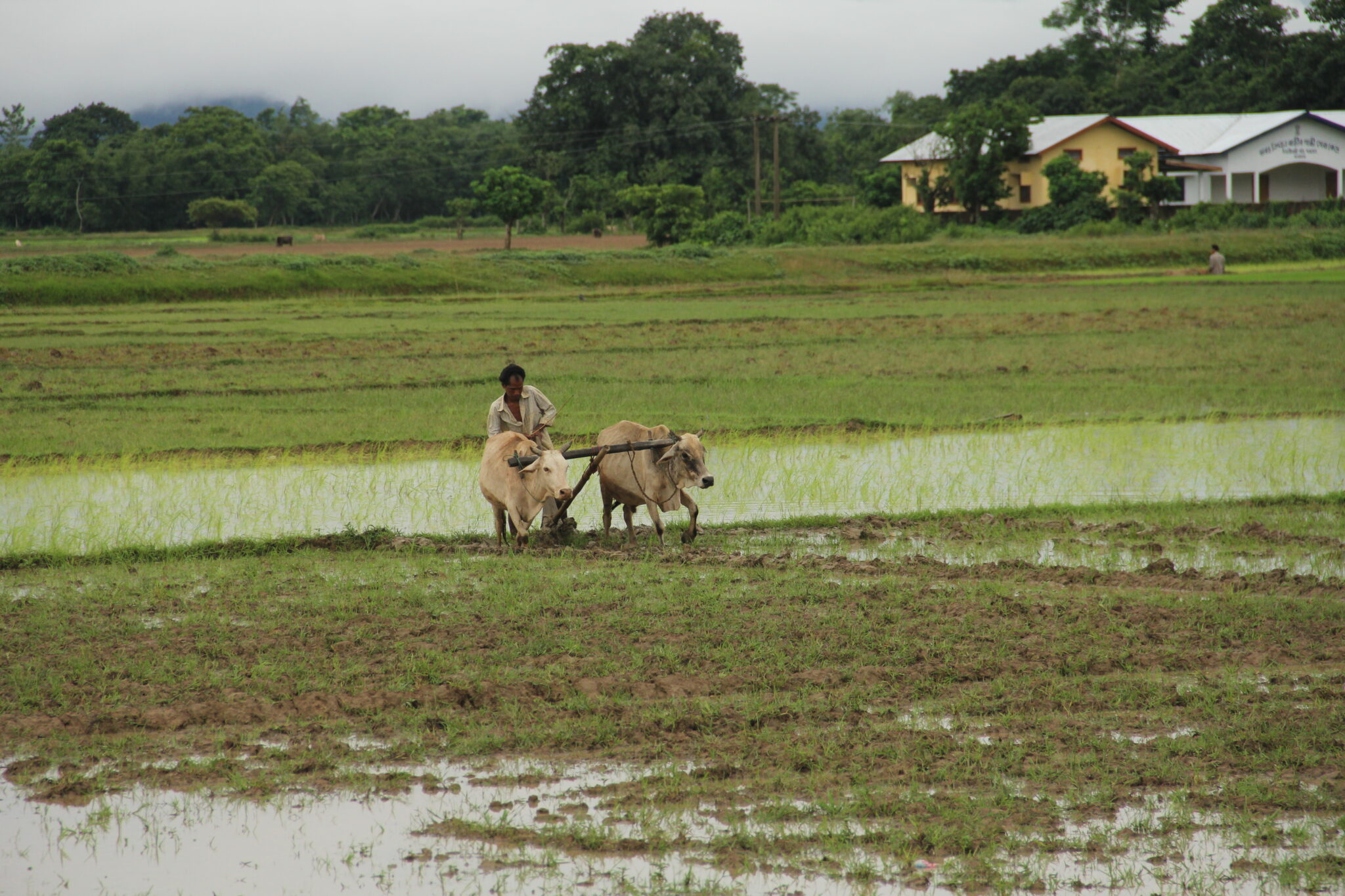With technology making strides in every sector, the Indian farmer is finally teching up.
With increasing digitalisation of India, today technology can address most of the challenges that farmers face from soil issues, climate, irrigation, to supply chain gaps. It can help them predict weather patterns more accurately, adopt more sustainable irrigation practices, reduce wastage and, in turn, enjoy better yields and higher incomes.
Today, with the help of digital agricultural solutions built using computer vision and deep-learning algorithms, farmers can monitor crop and soil health, know about the genetic engineering of seeds, learn best practices for cultivation, and engage in better livestock monitoring.
They can use predictive analytics-based tools to understand environmental impacts on crop yields and plan the best course of action. We also have easy-to-use digital platforms, which help farmers adapt faster to climate-smart agricultural practices, especially in flood and drought-prone regions.
The Tech Panda spoke to a few agtech startups to find out how tech is revolutionising the agriculture sector.
“Farmers can now use something as simple as their smartphones to receive timely updates, relevant information and monitor their crops. More farmers are beginning to understand how leveraging solutions that use the latest technologies such as AI and ML offers them greater climate resilience, higher crop yield, and better price control,” says Amit Sinha, Co-Founder of Unnati a FinTech agriculture ecosystem to empower farmers with credit services, farm knowledge, and predictive diagnostics.

Amit Sinha
More farmers are beginning to understand how leveraging solutions that use the latest technologies such as AI and ML offers them greater climate resilience, higher crop yield, and better price control
“There is no ambiguity and exception in understanding that technology will now be significant in revolutionizing agriculture sector,” says Navneet Ravikar, Chairman and Managing Director of Leads Connect Services, an analytics company developing a system of risk management that helps farmers mitigate risks before, during, and after harvesting of crops, promoting climate resilient smart agriculture practices and providing market linkages, from farm to fork.
“Technology is now key in connecting different aspects of agriculture for bringing ‘speed, accuracy, transparency, implementation, traceability and linking’ in the agricultural ecosystem,” he says.
“Agricultural sustainability is possible when we succeed in bridging gaps between different aspects of it. Moreover, extreme weather conditions are on the rise and widespread, and hence, robust frameworks are needed for ‘alerts and advisory’ to farmers. Such frameworks will also help in ‘climate smart technology interventions’, he adds.

Navneet Ravikar
In the wake of escalating global population and climate change, food security will be a major threat. Technology, therefore, in all likelihood, will be the core of agtech in the near future as there will be no other way but to embrace it with open hands
In addition, he says that it’s important to understand the need for a one stop platform solution to connect ‘agriculture’ and ‘economy’ effectively and optimally, which is only possible through aggressive technology intervention.
Last but not the least, the COVID-19 pandemic made clear that technology has to be a part of every design that intends to address the challenges of humanity.
“In the wake of escalating global population and climate change, food security will be a major threat. Technology, therefore, in all likelihood, will be the core of agtech in the near future as there will be no other way but to embrace it with open hands,” he says.
AI in Agtech
Technologies such as Artificial Intelligence, Machine Learning, and data analytics drive decision-making today, says Thirukumaran Nagarajan, Co-Founder, CEO, Ninjacart.
For example, Ninjacart analyses consumer purchasing history and order frequency to determine the type of produce to procure.
“It allows us to track produce and, as a result, provide complete transparency across the food value chain. By providing a ‘harvest the farm’ calendar with a weather forecast, we notify farmers about what is expected of them for that particular month,” he says.

Thirukumaran Nagarajan
It allows us to track produce and, as a result, provide complete transparency across the food value chain. By providing a ‘harvest the farm’ calendar with a weather forecast, we notify farmers about what is expected of them for that particular month
Similarly, Unnati’s predictive farming model is shaping the future of farming with its sophisticated technology. The model helps farmers in making precise decisions based on over 200 parameters drawn from satellite information, transaction history, farmer’s pattern, soil information, and weather information among others.
“Learning from historical and future data based on measured variables massively impacts efficiencies and processes,” says Sinha.
Unnati’s platform helps the farmers identify the best times for sowing, tracking the health of their crops throughout their cycle, identifying moisture pattern of crops, identifying nutrient movement and behaviour, and predicting when and where the crops need protection products, all across varying conditions in the field. It also helps farmers sell their produce with maximum profitability.
Role of Analytics in Modern Agriculture
Technology intervention has a pivotal role in modern agriculture. Consequently, humungous data is on the plate of agritech researchers and practitioners for churning and deciphering agricultural complexities.
How are we using analytics to make the most of this data?
“Real time analysis of field conditions with accuracy and precision is also very important for implementing effective agricultural solutions. Moreover, it is essential to consider that array of factors pertaining to crop phenology, meteorology, pedology, crop management and socio-economy/cognition affect agricultural productivity,” Ravikar explains.
“It therefore becomes indispensable to use analytical frameworks which are capable of studying parameters in sync/association with reference to all influential factors and in generating deep dive insights for agricultural system. It also helps in construing the sensitivity of a system to identify optimal solutions,” he adds.
For instance, Leads Connect has developed and delivered analytical solutions for crop health monitoring, claims & risk assessment and yield prediction using space technology and artificial intelligence. These solutions are capable of monitoring crop health in real time.
Timely updates and information with accuracy is essential for increasing agricultural productivity. This will also help farmers in identifying appropriate measures for mitigating agricultural hazard risks
Also, it helps in identifying aberrations in crop health if there are any along with assessing the possible reasons for such aberrations. Moreover, we have developed frameworks for loss assessment using space technology and space-time association analytics, and also developed machine learning based framework for yield prediction.
“Timely updates and information with accuracy is essential for increasing agricultural productivity. This will also help farmers in identifying appropriate measures for mitigating agricultural hazard risks,” he says.
“In addition, it is essential to understand that information and updates to farmers should be lucid for hassle free implementation,” he adds.
In this context, these days, agtech analytics has been instrumental in supporting farmers. Farmers now have real time farm updates with alerts and advisory that helps them to either prevent or mitigate the risks.
For instance, providing timely update/alert to farmers about a possible situation of crop stress, will alert them about two possibilities for which required actions need to be taken to contain the risk.
“First, it hints towards the likelihood of inadequate irrigation, and therefore, requires measures related to irrigating the crops need to be taken. And secondly, this update alerts them about the possibility of crop disease and therefore pertinent actions would be required. Similarly, in many ways, analytics has potential to make farmers life easier,” he explains.
Fintech to Agri-fintech
FinTech is a true pivot point for Indian agriculture, where much still needs to be done. Approximately 30% if farmers can access institutional credit, while 70% are still dependent on informal credit.
Agritechs such as Samunnati, Jai Kisan and NBFCs like Avanti are lending to farmers, FPOs and value chain players at scale mixing smart data intervention, market linkages, partnerships and a phygital approach.
According to Inc42, this has pushed many established agtech companies in market linkages, post-harvest, agri input and data centric models to incorporate financing or credit enabling as part of their main offering. Moreover, several new agri-fintech companies such as Agrifi, Gray Matter Technologies, Arboreum, and IBISA are trying to create a unique model and algorithm in agri-fintech as well as agri-Insuretech.
FinTechs are coming up with pay later options, microloans, and credit facilities for farmers for farm and farm-related activities, and for distributors by helping them in eliminating hurdles in business operations
FinTech is one of the technologies that has begun to assist farmers in achieving financial independence. It’s enabling farmers and agribusinesses to build financial resilience, also simultaneously strengthening the agriculture value chain by benefiting both farmers and local distributors.
“FinTechs are coming up with pay later options, microloans, and credit facilities for farmers for farm and farm-related activities, and for distributors by helping them in eliminating hurdles in business operations,” says Sinha.
Read more: How technology can include rural India in its FinTech success story
Many post-harvest agtech entities that offer warehousing services like Arya, Origo, Star Agri, NCML, NBHC, and Ergos were the first to facilitate financing via bank partnership or by launching their own NBFCs to lend against the warehouse receipts.
Most of them are trying to add a digital layer to the physical infrastructure to digitise the process of processes like stock arrival, weighing, quality assaying, receipt and pledge generation to make loan disbursal better without bankers necessarily doing a physical visit or audit at the warehouse.












